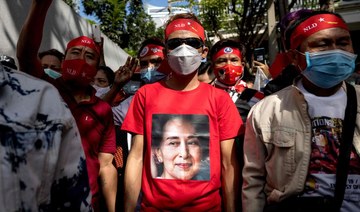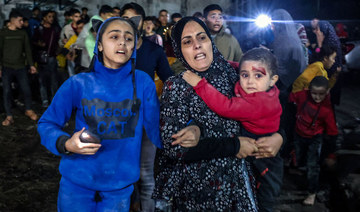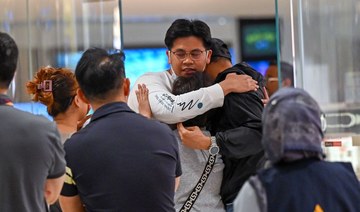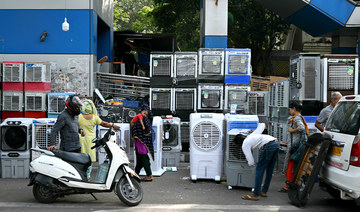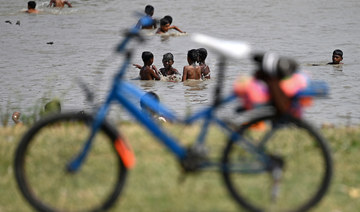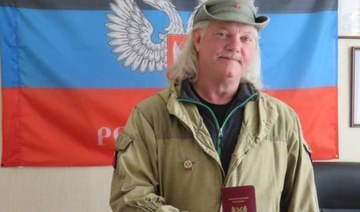BANGKOK: A court in military-ruled Myanmar convicted the country’s ousted leader Aung San Suu Kyi of corruption Friday, sentencing her to seven years in prison in the last of a string of criminal cases against her, a legal official said.
The court’s action leaves her with a total of 33 years to serve in prison after a series of politically tinged prosecutions since the army toppled her elected government in February 2021.
The case that ended Friday involved five offenses under the anti-corruption law and followed earlier convictions on seven other corruption counts, each of which was punishable by up to 15 years in prison and a fine.
The 77-year-old Suu Kyi has also been convicted of several other offenses, including illegally importing and possessing walkie-talkies, violating coronavirus restrictions, breaching the country’s official secrets act, sedition and election fraud.
Her previous convictions had landed her with a total of 26 years’ imprisonment.
Suu Kyi’s supporters and independent analysts say the numerous charges against her and her allies are an attempt to legitimize the military’s seizure of power while eliminating her from politics before an election it has promised for 2023.
In the five counts of corruption decided Friday, Suu Kyi was alleged to have abused her position and caused a loss of state funds by neglecting to follow financial regulations in granting permission to Win Myat Aye, a Cabinet member in her former government, to hire, buy and maintain a helicopter.
Suu Kyi was the de facto head of government, holding the title of state counsellor. Win Myint, who was president in her government, was a co-defendant in the same case.
Friday’s verdict, delivered on the outskirts of the capital Naypyitaw, was made known by a legal official who insisted on anonymity for fear of being punished by the authorities. The trial was closed to the media, diplomats and spectators, and her lawyers were barred by a gag order from talking about it.
The legal official said Suu Kyi received sentences of three years for each of four charges, to be served concurrently, and four years for the charge related to the helicopter purchase, for a total of seven years. Win Myint received the same sentences.
Win Myat Aye, at the center of the case, escaped arrest and is now Minister of Humanitarian Affairs and Disaster Management in the National Unity Government, established by the military’s opponents as a parallel administration by elected legislators who were barred from taking their seats when the army seized power last year. The military has declared NUG to be an outlawed “terrorist organization.”
The defendants denied all charges, and her lawyers are expected to appeal in the coming days. The official also said both Suu Kyi and Win Myint appeared to be in good health.
Cases against Suu Kyi were manufactured and court verdicts predetermined by the military, Phil Robertson, deputy Asia director of Human Rights Watch, said in an emailed statement.
“Due process and a free and fair trial were never remotely possible under the circumstances of this political persecution against her,” he added.
The end of the court cases against Suu Kyi, at least for now, raises the possibility that she would be allowed outside visitors, which she has been denied since she was detained.
Myanmar’s military rulers, who have faced diplomatic and political sanctions for their human rights abuses and suppression of democracy, have repeatedly denied all requests to meet with her, including from the Association of Southeast Asian Nations, which seeks to help mediate an end to the crisis in Myanmar that some United Nations experts have characterized as a civil war because of the armed opposition to military rule.
An August statement from the military government said that, “depending on the circumstances after the completion of the judiciary process, we will consider how to proceed.”
Due to her age, the 33 years in prison that Suu Kyi now faces “amount to an effective life sentence against her,” said Robertson, adding that the convictions were aimed at keeping her out of politics and undermining her party’s landslide 2020 election victory.
Nay Phone Latt, a spokesperson for the National Unity Government opposition group, charged Myanmar’s judiciary with being “completely unjust.”
He said in a online message that the ruling military council might release Suu Kyi and other prisoners or make similar gestures if it is necessary for their own interests, but revolutionary forces would move forward without losing sight of their goal of a democratic federal union without the involvement of the military.
Suu Kyi is being held in a newly constructed separate building in the prison in Naypyitaw, near the courthouse where her trial was held, with three policewomen whose duty is to assist her.
Suu Kyi, the daughter of Myanmar’s martyred independence hero Gen. Aung San, spent almost 15 years as a political prisoner under house arrest between 1989 and 2010.
Her tough stand against the military rule in Myanmar turned her into a symbol of nonviolent struggle for democracy, and won her the 1991 Nobel Peace Prize.
Her National League for Democracy party initially came to power after easily winning the 2015 general election, ushering in a true civilian government for the first time since a 1962 military coup.
But after coming to power, Suu Kyi was criticized for showing deference to the military while ignoring atrocities it is credibly accused of committing in a 2017 crackdown on the Muslim Rohingya minority.
Her National League for Democracy won a landslide victory again in the 2020 election, but less than three months afterwards, elected lawmakers were kept from taking their seats in Parliament and top members of her government and party were detained.
The army said it acted because there had been massive voting fraud in the 2020 election, but independent election observers did not find any major irregularities.
The army’s takeover in 2021 triggered widespread peaceful protests that security forces tried to crush with deadly forces and that soon erupted into armed resistance.
Myanmar security forces have killed at least 2,685 civilians and arrested 16,651, according to a detailed list compiled by the Assistance Association for Political Prisoners, a non-governmental organization that tracks killings and arrests.
Court in Myanmar again finds Suu Kyi guilty of corruption
https://arab.news/we7ju
Court in Myanmar again finds Suu Kyi guilty of corruption

- Oxford-educated Nobel laureate has spent much of her political life in detention under military governments
Germany, Portugal say time not ripe to recognize Palestinian state

- “There is no clarity about the territory of the state and other questions related to it,” Scholz said
- Montenegro said Portugal was also “not in the position to” recognize a Palestinian state
BERLIN: The leaders of Germany and Portugal said Friday the time was not ripe to recognize a Palestinian state, after three other European nations announced plans to do so.
“We have no reason to recognize the Palestinian Authority as a separate state now,” Chancellor Olaf Scholz told a press conference after talks with Portuguese Prime Minister Luis Montenegro.
“There is no clarity about the territory of the state and other questions related to it,” he said.
“What we need is a negotiated solution between Israel and the Palestinians that amounts to a two-state solution... but we are still a long way from there,” he said.
“Symbolic recognition of statehood does not bring us further” toward the goal, he added.
Speaking at the same press conference, Montenegro said Portugal was also “not in the position to” recognize a Palestinian state.
“We are waiting for the (related) issues to be further discussed within the European Union,” he added.
Ireland, Norway and Spain on Wednesday announced they intended to recognize the State of Palestinian next week.
The announcement drew fury from Israel, which warned of “serious consequences” for ties with the European nations.
For decades, formal recognition of a Palestinian state has been seen as the end goal of a peace process between Palestinians and Israel.
The United States and most western European nations have said they are willing to one day recognize Palestinian statehood, but not before agreement is reached on thorny issues like final borders and the status of Jerusalem.
Top UN court orders Israel to halt military operation in Rafah, Israel is unlikely to comply
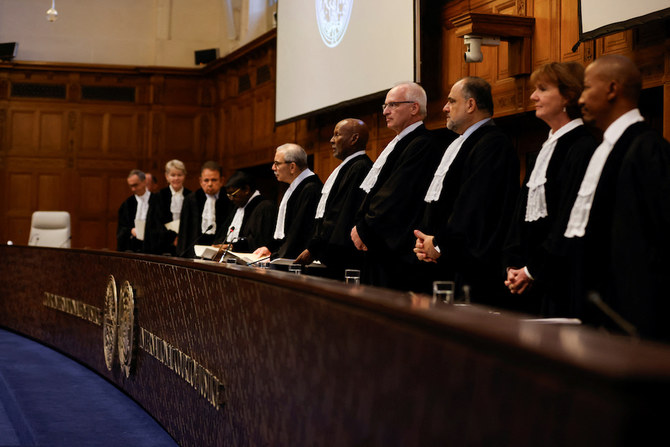
- The ICJ order further ratchets up international pressure on an increasingly isolated Israel to rein in its war on Hamas in Gaza
- Friday’s decision marked the third time this year the 15-judge panel has issued preliminary orders seeking to rein in the death toll and alleviate humanitarian suffering in Gaza
THE HAGUE: The top United Nations court has ordered Israel to halt its military operations in the southern Gaza city of Rafah. Israel insists it has the right to defend itself from Hamas militants and is unlikely to comply with the ruling.
The order by the International Court of Justice further ratchets up international pressure on an increasingly isolated Israel to rein in its war on Hamas in Gaza.
Friday’s decision marked the third time this year the 15-judge panel has issued preliminary orders seeking to rein in the death toll and alleviate humanitarian suffering in Gaza.
While orders are legally binding, the court has no police to enforce them.
Earlier Friday, the ICJ opened its hearing to rule on the request to order Israel to halt its military operation in Gaza and withdraw from the enclave.
Criticism of Israel’s conduct in the war in Gaza has been growing — even from its closest ally, the United States, which warned against an invasion of the southern city of Rafah, where hundreds of thousands of Palestinians have sought shelter from fighting elsewhere. And this week alone, three European countries announced they would recognize a Palestinian state, and the chief prosecutor for another UN court requested arrest warrants for Israeli leaders, along with Hamas officials.
Israeli Prime Minister Benjamin Netanyahu is also under heavy pressure at home to end the war, which was triggered when Hamas-led militants stormed into Israel, killing 1,200 people, most civilians, and taking some 250 captive. Thousands of Israelis have joined weekly demonstrations calling on the government to reach a deal to bring the hostages home, fearing that time is running out.
While the International Court of Justice has broad powers to order an end to the Israeli military campaign and any such ruling would be a blow to Israel’s international standing, it does not have a police force to enforce its orders. In another case on its docket, Russia has so far ignored a 2022 order by the court to halt its full-scale invasion of Ukraine.
Israel signaled it, too, would brush off an ICJ order to stop its operations. “No power on earth will stop Israel from protecting its citizens and going after Hamas in Gaza,” Avi Hyman, the government spokesperson, said in a press briefing Thursday.
The court’s president, Nawaf Salam, opened Friday’s hearing, as a small group of pro-Palestinian protesters demonstrated outside.
The ceasefire request is part of a case filed late last year by South Africa accusing Israel of committing genocide during its Gaza campaign. Israel vehemently denies the allegations. The case will take years to resolve, but South Africa wants interim orders to protect Palestinians while the legal wrangling continues.
At public hearings last week at the International Court of Justice, South Africa’s ambassador to the Netherlands, Vusimuzi Madonsela, urged the panel of 15 international judges to order Israel to “totally and unconditionally withdraw” from the Gaza Strip.
The court has already found that Israel’s military operations pose a “real and imminent risk” to the Palestinian people in Gaza.
Israel’s offensive has killed more than 35,000 Palestinians, according to Gaza’s Health Ministry, which does not distinguish between combatants and civilians. The operation has obliterated entire neighborhoods, sent hundreds of thousands of people fleeing their homes, and pushed parts of the territory into famine.
“This may well be the last chance for the court to act,” Irish lawyer Blinne Ní Ghrálaigh, who is part of South Africa’s legal team, told judges last week.
Israel rejects the claims by South Africa, a nation with historic ties to the Palestinian people.
“Israel takes extraordinary measures in order to minimize the harm to civilians in Gaza,” Tamar Kaplan-Tourgeman, a member of Israel’s legal team, told the court last week.
In January, ICJ judges ordered Israel to do all it can to prevent death, destruction and any acts of genocide in Gaza, but the panel stopped short of ordering an end to the military offensive. In a second order in March, the court said Israel must take measures to improve the humanitarian situation.
The ICJ rules in disputes between nations. A few kilometers (miles) away, the International Criminal Court files charges against individuals it considers most responsible for war crimes, crimes against humanity and genocide.
On Monday, its chief prosecutor, Karim Khan, said he has asked ICC judges to approve arrest warrants for Netanyahu, Defense Minister Yoav Gallant and three top Hamas leaders — Yahya Sinwar, Mohammed Deif and Ismail Haniyeh — of war crimes and crimes against humanity in the Gaza Strip and Israel.
Israel is not an ICC member, so even if the arrest warrants are issued, Netanyahu and Gallant do not face any immediate risk of prosecution. But the threat of arrest could make it difficult for the Israeli leaders to travel abroad.
Passengers had seconds to react as turbulence hit Singapore flight

- Passengers and crew on the flight sustained skull, brain, and spine injuries as they were tossed violently around the cabin
- The flight carrying 211 passengers and 18 crew was forced to make an emergency landing in Bangkok
BANGKOK: A Malaysian woman whose six relatives and a friend were injured on a Singapore Airlines flight hit by deadly turbulence this week said on Friday they had only seconds to react before the plane started to plunge.
One passenger died and more than 100 were injured when the Boeing 777-300ER fell 1,800 meters (6,000 feet) in just a few minutes during the final hours of its journey from London to Singapore on Tuesday.
Passengers and crew on the flight sustained skull, brain, and spine injuries as they were tossed violently around the cabin.
The flight carrying 211 passengers and 18 crew was forced to make an emergency landing in Bangkok, where at least 48 people are still being treated in hospital.
Eva Khoo, who prayed for her family at the Erawan Shrine in the Bangkok city center on Friday, said she was desperately concerned for her pregnant sister-in-law.
“My sister-in-law had to have surgery on her spine,” she told AFP.
“I am really worried because she is pregnant.”
The family was returning from a two-week holiday in Switzerland and Britain.
Khoo said her brother was still in pain after the high-altitude ordeal.
“His hand is in pain and still numb,” she said.
“He couldn’t carry anything. He still needs a wheelchair to move him around.”
She said four of her relatives who were on the flight were treated in intensive care at a Bangkok hospital.
“Some of them are still in bed and can’t be moved,” she said.
Her brother told her that the seatbelt sign was off and the situation was “very calm” when the turbulence hit.
“They were serving food and collecting rubbish and suddenly the plane was shaking and my brother and his wife were sitting without (a) seatbelt,” she said.
“They felt the vibration and the shaking, they wanted to fasten the seatbelt, but (they) only (had) a few seconds.”
Her brother “flew away” and hit the floor while he was trying to fasten his belt, she said.
Her sister-in-law flew up and dropped onto a seat in the plane.
She said a family friend who was on the flight had fastened his seatbelt but still sustained a neck injury and will have to use back support for at least six months.
The plane was met at Bangkok’s Suvarnabhumi Airport by emergency responders who used gurneys to ferry the injured to ambulances waiting on the tarmac.
Photos taken inside the plane after it landed in Bangkok show the cabin in chaos, strewn with food, drinks and luggage, and with oxygen masks dangling from the ceiling.
Singapore Airlines chief executive Goh Choon Phong has apologized for the “traumatic experience” and expressed condolences to the family of the deceased — a 73-year-old British man.
The carrier said on Friday it has tightened seatbelt rules on its flights after the incident and that it has introduced a “more cautious approach” to turbulence.
Investigators are analizing cockpit data — including the voice recorder — as they seek to understand the cause of the deadly incident.
Air safety experts have told AFP that passengers are often too casual about wearing seatbelts, leaving them at risk if the plane hits unexpected turbulence.
Scientists also warn that so-called clear air turbulence, which is invisible to radar, is getting worse because of climate change.
Parts of India boil as temperatures near 50 C
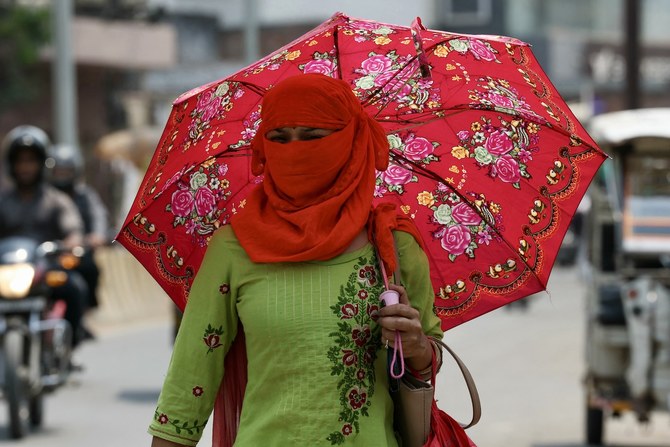
- Delhi and neighboring states are on ‘red alert’ over increasing heat
- Doctors observe a 30 percent jump in heat-related cases in Rajasthan
NEW DELHI: Parts of India continued to reel under a prolonged extreme heat spell on Friday, with temperatures in northern regions expected to soar to nearly 50 degrees Celsius over the weekend.
India’s summer temperatures often peak in May, but heatwave days have been more severe than usual this year.
The Delhi capital region and the nearby states of Punjab, Haryana, Rajasthan, Chandigarh and Uttar Pradesh have been under the India Meteorological Department’s “red alert” — its highest warning — since Wednesday.
Temperatures soared beyond 45 C in many of the regions and touched 48.8 C in Rajasthan’s Barmer city on Thursday — the highest temperature recorded in the country this year so far, which was forecast to increase even further in the coming days.
“The situation has been grim. There is a heatwave in large parts, and it is severe in some pockets in Rajasthan and parts of Punjab and Haryana, and (it’s) likely to continue till the month’s end,” G.P. Sharma, chief forecaster at Skymet, India’s leading weather and agriculture risk consultancy, told Arab News.
“There is going to be no letup in western Uttar Pradesh and Rajasthan and Gujarat … They will have extreme temperatures, reaching about 49 degrees.”
IMD data showed that temperatures in Rajasthan may cross 49.6 C on Sunday.
Devi Singh, a tourism professional working in the state said one had to “feel it to believe” that it could be this hot.
“The heat is too much and people are really suffering,” she told Arab News. “Life has almost come to a standstill. Business has suffered. Very few tourists are coming. In this heat, people don’t want to venture out.”
Not venturing out is also what doctors advise their patients as they observe a rise in heat-related cases.
“We advise them not to leave home after 10 a.m. in the morning, and leave home only after 5 p.m. Even if you have to step out during the daytime, hydrate yourself properly … Consult doctors immediately if you have any symptoms,” said Dr. Vikas Chowdhury from the Thar Hospital in Barmer city.
“There has been an increase of at least 30 percent in patients with heatwave conditions like dryness of throat, dehydration, vomiting, decrease in appetite, a burning sensation and fever.”
Many Indians, however, have to be outside for work.
“I’ve been feeling dizzy because of the heat,” said Shivam Kumar, a cameraman in Delhi, as he prepared to cover the fifth phase of the ongoing general election, which will be held in the capital on Saturday.
“I have to work anyway because inflation is so high. I have to work to survive, as there is so much unemployment.”
American soldier arrested in Russia over an alleged theft will remain in custody, state media report
American soldier arrested in Russia over an alleged theft will remain in custody, state media report

- The soldier, identified by court officials as Gordon Black, will remain in custody at least until July 2
- Officials said that Black, who is married, traveled to Russia to see a longtime girlfriend
MOSOCW: An American soldier arrested in Russia’s far eastern city of Vladivostok on charges of stealing lost an appeal against his detention and will remain in custody, Russian state news agency RIA Novosti reported Friday, citing court officials.
The soldier, identified by court officials as Gordon Black, will remain in custody at least until July 2, the report said, after the Primorsky Regional Court upheld the lower court’s ruling to place Black in custody pending investigation and trial.
Several US officials said earlier this month that Black, a 34-year-old staff sergeant, was stationed in South Korea and was in the process of returning home to Fort Cavazos in Texas. Instead, officials said that Black, who is married, traveled to Russia to see a longtime girlfriend. He was detained in Vladivostok, a major military and commercial Pacific port in Russia’s Far East, and accused of stealing from her.
RIA Novosti said, citing local police, that Black has admitted guilt and is cooperating with investigators.
Black’s arrest further complicates US relations with Russia, which have grown increasingly tense as the war in Ukraine drags on.
Russia is known to be holding a number of Americans in its jails, including corporate security executive Paul Whelan and Wall Street Journal reporter Evan Gershkovich. The US government has designated both as wrongfully detained and has been trying to negotiate for their release.
Others detained include Travis Leake, a musician who had been living in Russia for years and was arrested last year on drug-related charges; Marc Fogel, a teacher in Moscow, who was sentenced to 14 years in prison, also on drug charges; and dual nationals Alsu Kurmasheva and Ksenia Khavana.



